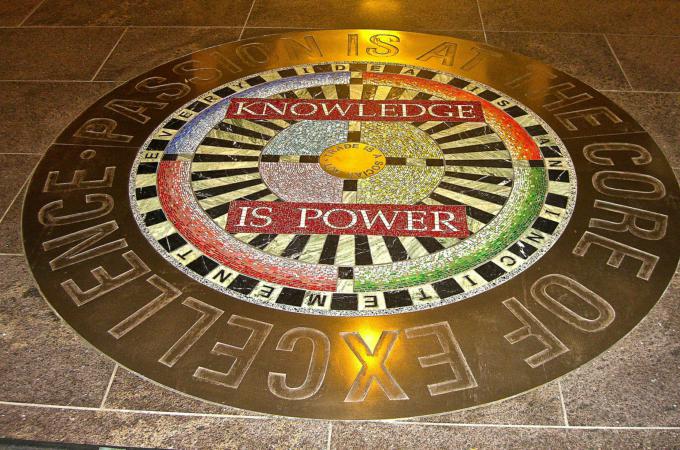Freeing up space for the love of knowledge
This is important: a university is a natural institution. But let's define terms.
By an "institution" I mean a repeatable form of human association, with a structure that is "objective" in the sense that it exists independently of the will of the members. By "natural" I mean the institution arises to meet some need of human nature, with the assistance of natural impulses.
Thinkers in the classical tradition used to say that there are two natural institutions, the family and the nation. The family, they said, arises by nature to meet the daily needs, the nation to meet the complete needs of human life.
Russell Hittinger in his 2017 First Things lecture ("The Social Vision of Leo XIII in the Twenty-First Century") built on this tradition and added the Church, as now a supernatural institution. The essence of Catholic Social Teaching, he said, until very recently, consisted of instruction on how we ought to live in these three "necessary societies" -- family, state, and church.
He added that waves of popular revolutions since the 1960s have compromised all of these institutions, even the Church in its human dimension, and so Catholic Social Teaching has new tasks, some of these evident in the sometimes unsettling preaching of Pope Francis.
And yet there seem to be two more natural institutions besides the family and the state -- the market and the university.
The nature of the market is perhaps most evident in a small setting such as a village. There the market is a place of exchange of products, at agreed upon fair rates, among persons who have specialized in the making of one such product, for the provision of the basic goods necessary to human life, which man, unlike other animals, is not given at birth.
Non-human animals come into this life with a coat and shoes, and ecological niches where they can find, as if set aside for them, their own shelter and food. But human beings must contrive all of these things, and they do so best if each works on just one separately, and then they meet to exchange.
The market so described is obviously a natural institution. It is an important source of social unity, too, judging from its usual location at the center of all old villages, right next to the church and the town hall.
But a university is a natural institution too, at least if we grant certain premises. Suppose with Aristotle we agree that "all men by nature desire to know." Suppose we agree, too, with Aquinas and the classical tradition, that we desire to know everything without restriction -- "the whole of being," as Plato put it, and not just part of being cut off and looked at in isolation.
Of course this desire to know everything is easily damaged -- by emotional distress from broken families, peer pressure, the distractions of electronic technology, and too-early sexual interest. Nonetheless it is a yearning we all have simply by having a mind and being made in the image of the Creator God, as fundamentally it is a desire for God. But no one can meet this natural desire to know everything through his own efforts. Like the market, there must be specialization and sharing. But that is just what a university is.
We might actually want to say there are two such natural institutions, the university and the college. After all, the natural desire to know is met both by the discovery of new knowledge and the transmission of discovered knowledge. A research university (a kind of academic city-state) seems the place for the one, and a college (a kind of academic household) for the other.
"All very interesting," you might say, "but why is this important to Catholics?" Because it falls within the vocation of the laity. The laity are charged with sanctifying human realities. But sanctifying implies first safeguarding them, and building them up correctly, in the light of Christ. But we cannot do these things without first understanding those realities.
That is why the very first lines of that great charter of Catholic higher education by Pope St. John Paul II, "Ex Corde Ecclesiae," begins by affirming the nature of a university: a university, it says, is an association of professors together with students, which "frees up a space" ("vacat") for them to associate, precisely out of a shared love of knowledge, just for its own sake.
One could develop an entire doctrine of the university from this word "vacat," as Joseph Pieper saw, in his book on leisure. It is the same word as our "vacation." It's the idea of "free time." It raises the question of what you want to do, not what you have to do. In a genuinely Catholic university and Catholic college, this character of genuine "leisure" for truth would shine forth, precisely as a consequence of the faith.
Most importantly: although such institutions need to affirm the Catholic faith -- and certainly should not give a platform to those who undermine the faith -- that faith must work itself out, in these institutions, not as something extrinsic to learning, but precisely by giving greater vitality to the genuine love of truth.
This is a difficult task in our day, when the genuine love of truth for its own sake is under attack from both political correctness and extremes of pre-vocationalism. But the first thing is to know the end.
- Michael Pakaluk is Professor of Ethics and Social Philosophy in the Busch School of Business at The Catholic University of America. His book on the gospel of Mark, ‘‘The Memoirs of St. Peter,’’ is available from Regnery Gateway.



















